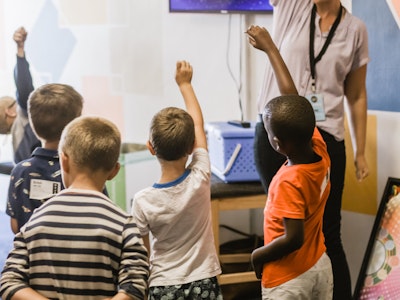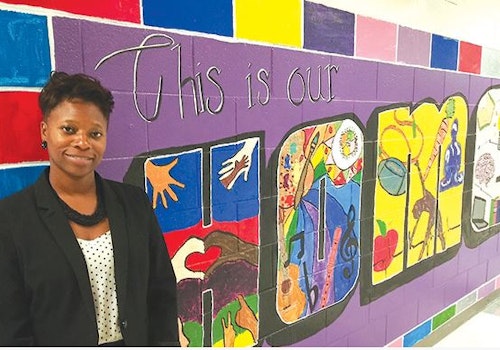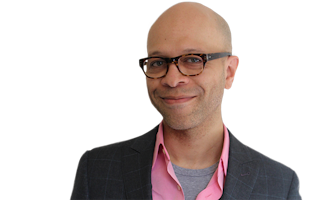Education, Equity, and Opportunity: Unlocking Everyone's Potential
For decades, our educational systems have faced the same systemic inequities seen in other areas of society. Education policy — from school choice to funding to assessments — can help unlock access to opportunity for all.
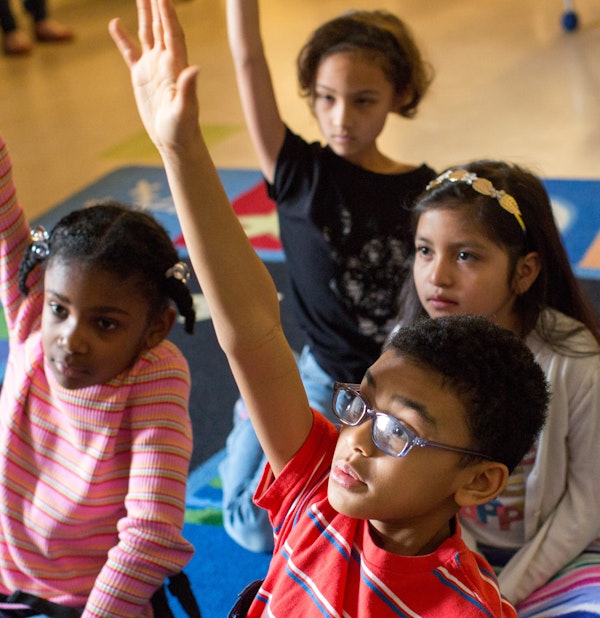
Derrell Bradford is the executive vice president of 50CAN (The 50-State Campaign for Achievement Now), an education nonprofit that advocates for stronger, more equitable schools around the country. He also serves on several boards of education nonprofits that support children and families.
He talked with Anne Wicks, the Ann Kimball Johnson Director of the Education Reform Initiative at the Bush Institute, about the importance of choice, what he’s hearing from parents across the country, and how COVID affects the school year ahead.
Below are excerpts from their discussion, which has been edited for length and clarity.
Why do achievement gaps still persist, and what should we be doing differently?
If you’re a person who’s like us, you believe that schools have an incredibly important role in helping to create a freer and better society, and that education is a pillar upon which that society rests. If you believe that, then you’re going to go all in on radically changing that institution. We have been trying to do that for a long time. We’ve tried to change the way we measure success. We’ve tried to change the way people access greatness or are not forcefully directed to schools that don’t meet their needs, or that don’t help kids become the best version of themselves.
I think what we got wrong was not recognizing how much inertia there is in this system. The weight of American traditional public education — how kids are assigned, how the money is raised and distributed, who gets what teacher, what level of underperformance is acceptable versus what level of success is aspired to — all of those qualities are wired into the traditional system in ways that well-meaning, reform-minded people just wildly underestimated.
The big question is, now that we know those things, now that you can diagram out where all the friction is in exquisite detail, what are we going to do about it? Maybe that’s the set of questions for the next 10 years of reform.
When you think about some of those “exquisitely detailed” areas of friction, where are you paying the most attention or see the most possibility?
As a social matter, I think there is interest in the long-term effects of redlining and how that has fledged the current system. It has intertwined race and the delivery of the current education system in a way that no person who believes in markets and freedom — and no person who believes in equality — should be able to get behind.
You couldn’t design a less equitable system than by using school assignment zones and then layering them on housing zones to ensure that students will go to specific schools. And, then you add purposely depressing the property value in one place, and allowing property values to rise in another, and making property taxes the primary means to fund schools. If you did that, you must want a deeply inequitable system that is divided by resources and race.
You couldn’t design a less equitable system than by using school assignment zones and then layering them on housing zones to ensure that students will go to specific schools.
I am concerned that people want to solve that problem by saying we should just equalize the money, which is completely insufficient. Yes, property taxes may be the most stable way to fund schools. But collecting them and distributing them better or changing taxing jurisdictions is a half measure. Until you get at residential assignment, you haven’t really untangled that whole thing. This is a long-standing, deeply entrenched, clearly obvious manifestation of racial injustice.
Culture is all the decisions that were made before you got here. You’re born, all these systems are set up. You buy your house because your school is bundled with it, and off you go. I do think that people often play by rules that were built before they got here.
So, whenever we talk about big change like this, I think it’s always important to help people reconcile the fact that you may be a part of the problem, even if you didn’t create it. I don’t necessarily blame you for that. What I blame you for is, once you realize the enemy is us, well, then you have a responsibility to do something about it.
As Arthur Brooks says, you can’t lead with contempt. The taxonomy of the pitch matters. If you start from a place of incredible guilt and blame, you might get something short-term from somebody, but you won’t get the long-term buy-in that you need to make the kind of big change we’re talking about.
Culture is all the decisions that were made before you got here. You’re born, all these systems are set up. You buy your house because your school is bundled with it, and off you go.
Education is this bizarre mix of governance and money and public good and equity, and how it all comes together results in what we’ve got, for the good or for the bad. When you think about how to improve how we organize public education, what do you want to see?
My opening gambit on this is that most people think public education is a right, and it isn’t. It’s a good. Being well-educated is to own a version of yourself that no one can take away, and that’s a good. As long as its access is bought and sold through the mortgage market, it’s a good. It’s important to understand that we have a good that is masquerading as a right. And if you know that, you will behave differently.
What has been revealed over time is that different kinds of school governance — independent school governance, charter boards or authorizers, school districts — are all good at doing different things. The way that they hold themselves accountable helps you figure out what they’re going to be good at doing.
The mix of choice and independent nonsecular governance gives you the St. Paul School for Boys, where I went to school. Choice, high-regulation governance in the Northeast within a guiding ethos of closing achievement gaps gives you Success Academy, Achievement First, or IDEA, networks that typically produce incredible gains for low-income kids of color. Districts typically do magnets well, which is to say, they do selectivity really well. They educate high-income kids pretty well, and they have the capacity to serve special needs students. And then, everything else is rolling the dice.
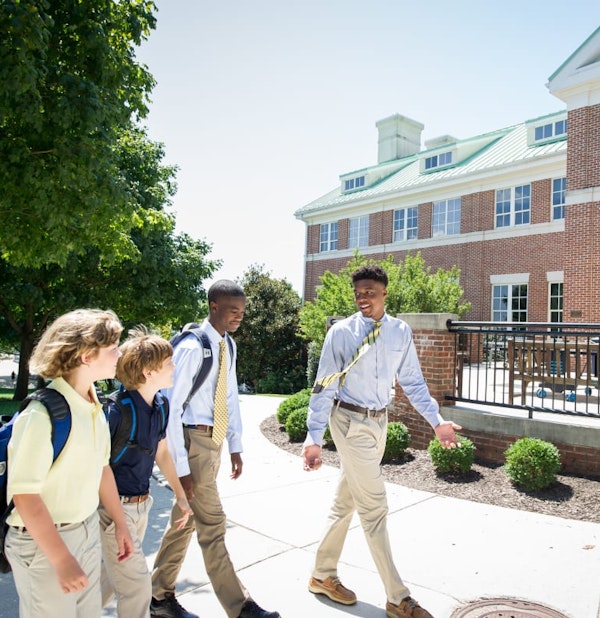 The St. Paul School for Boys near Baltimore, Maryland. Bradford credits the opportunity to go to the school as a catalyst in his life. (via St. Paul School for Boys)
The St. Paul School for Boys near Baltimore, Maryland. Bradford credits the opportunity to go to the school as a catalyst in his life. (via St. Paul School for Boys)
Being well-educated is to own a version of yourself that no one can take away, and that’s a good. As long as its access is bought and sold through the mortgage market, it’s a good. It’s important to understand that we have a good that is masquerading as a right.
I don’t think any of that is negative unless you want a monopoly on creating schools. I do not think that any one mode of school governance is the answer for all people, because no one mode of anything is the answer for all people. The right approach for a diverse nation should be a diverse one.
There’s a lot of discussion around choice, charters, magnets, and investing in our public systems. You focus a lot on choice and agency for kids. Why does that matter? Why is that so essential if we’re talking about increasing opportunity?
Choice is interesting because like discipline, it is both a policy and a value. So, what matters more to you informs what you will support. For some people, choice is only good if it’s a choice of something better. If you believe that, your internal bet is a rational one about improving educational opportunity.
In the other direction, there are people who believe that the right to self-determination is so fundamental that it obviates all other concerns. If you feel that way, you might be inclined to be like, “If a parent thinks it’s best, we should just let them go with it.”
I’ve historically been someplace in the middle. I very much think that results matter. But, for a person who grows up in a place where you don’t have a lot of choice, the ability to choose is about enabling aspects of the human condition that are essential, and frankly, that undergird our entire democracy.
I grew up in this neighborhood in southwest Baltimore that most people know because a Black boy named Freddie Gray died there, and the city burned as a result. I started in the school I was zoned to, but I had an aunt who taught in the Baltimore City public school system. So I had all kinds of leverage to get access to better schools.
One of my earliest memories is of my mother and my grandmother sitting at the kitchen table, talking about the address we were going to use so I could avoid the school I was zoned for and go to a better one. This is the way that lots of people experience public education in America. And, I finished at an independent K-12 all boys day school.
One of my earliest memories is my mother and my grandmother sitting at the kitchen table, talking about the address we were going to use so I could avoid the school I was zoned for and go to a better one. This is the way that lots of people experience public education in America.
 Derrell Bradford's childhood home in Baltimore. (via 50CAN)
Derrell Bradford's childhood home in Baltimore. (via 50CAN)
Going to that school changed my life in profound ways. I’m a Black kid from Baltimore. I wound up in the Ivy League. And so, the agency is really important for people who believe we need more options to help people get into schools to become the best versions of themselves. That’s always been my reason for advocating for more choice for parents and families, and ultimately for kids, because there is no one-size-fits-all.
I think there’s something tragic about the unknowing of who you could be because you were never able to learn who you could’ve been. Schools are such a vital and essential piece of the continuum of you trying to become who you should be. We can’t ignore what happens when a school is not well-positioned to help you do that. If there’s a better place down the street, I think we need to help people get there.
That unlocking of potential matters to all of us. That’s what is behind President Bush’s phrase “the soft bigotry of low expectations.” When you think about policy that supports that hopeful picture you’ve just described, what does it look like to you?
I grew up in education policy, as an expat from the publishing industry, during the implementation of No Child Left Behind. So, my view on success, failure, intervention, everything, is catalyzed by that statement of attacking “the soft bigotry of low expectations.” I had never heard anything so clearly get at the haze around the education of Black kids in particular, that made success difficult to see.
I think about three things around policy. One is about measurement. Standardized assessments matter a lot to parents of color. They like data. As districts rolled up the end-of-year assessments because of COVID-19, lots of parents in our network asked, “I need to know. When are we going to find out? Are we going to have an assessment at the start of school?” It really matters to have a way to measure progress that doesn’t throw away objectivity, while not having so many variables that everything is meaningless.
The second thing is about charter schools. We, in the education policy world, have a sense of what we think works, and that very well-described sense of what those things are has narrowed what is produced by the charter authorizing process. We have lots of charter schools that are really good at a couple things. They work really well for very specific groups of kids, but unlike their district school counterparts, they are not diverse enough in terms of offering, or location, or constituency, to maximize what chartering can do for more people over the long-term. This more diverse, open approach is important.
The last thing is about money. This loop of local property tax delivered to districts, regardless of where kids are in the schools, doesn’t work. I like the Education Savings Account idea, specifically right now during COVID-19. If you can curate something that will keep your kids on track, perhaps with some online tools and a tutor, I think we should foster that. We need that creativity and flexibility around finance.
In your work at 50Can, what do you learn from the families around the country?
Remember, the problems of parents are unique to their children. There’s an evolution that has to go on about political and policy knowledge that turns a parent who’s an advocate for their child into an advocate for all children.
Good advocacy isn’t me telling you what to be excited about. It’s you, being excited about what I’m excited about, when I’m not there. That transfer of ownership and information and power is critical.
Lots of our families are disappointed by what they see as a race to the bottom in some districts, catalyzed by COVID. They care about the talk of no assessments this fall. For many, this disruption showed them the worst instincts of school districts — without the constant monitoring that districts said they did not need, some districts choose to just fall to the very bottom and call it equity.
They care about the talk of no assessments this fall. For many, this disruption showed them the worst instincts of school districts — without the constant monitoring that districts said they did not need, some districts choose to just fall to the very bottom and call it equity.
So, what are you paying attention to, especially as we move into and through this coming school year?
I was a little bit like the skunk at the garden party this spring, when everybody said, “We need to get kids back in school!” I said to people, “In 2019, 18% of Black fourth-graders in this country tested proficient or above on the NAEP. And that’s what you want to run back to?” It’s important to remember, regardless of all the issues that have emerged, the place to which we want to return was a place we spent a quarter of a century trying to give people alternatives to.
We are watching what teachers want to do, and what parents and families want to do, because there are legitimate risks and issues on both sides, and the discussion has to embrace both sides. For instance, I’m highly sympathetic to teachers’ desire to return to the workplace safely. At the same time, some of the demands we are seeing from unions — like three-times-a-week COVID testing which we can’t do for anybody right now — shows they are not serious about reopening. That sort of posturing undermines the legitimate health concerns of teachers, because it’s unrealistic and obviously political. It doesn’t do service to the 20 percent of administrators and 18% of teachers who are 50 and above, and in the highly susceptible category.
Parents want to go back to work — they need to feed their families. That is a legitimate public policy concern that is not in the discussion right now. So, let’s talk about families and their desire to go back to work, because that matters. This isn’t economy over epidemiology. Economic concerns are real concerns.
Parents want to go back to work — they need to feed their families. … This isn’t economy over epidemiology. Economic concerns are real concerns.
We are also watching the battle around online learning. In the spring, everybody should’ve been focused on doing the best we can with virtual. I think we should have policies that open enroll the nation at this point. If you’re a great charter network or private school network or district, you should be able to take kids from any place in America at this point. If you figured it out, we need you.
Instead, on the one hand, there were people who were scared of distance learning as a disruptive force. And so, they attacked it, even though it was the only tool we had to educate kids in a universe where they can’t go to physical school.
Then, work rules started coming out that began as pro-teacher advocacy — and I don’t blame teachers for this but I absolutely blame their unions for it — and became unreasonable. In LA, they wanted only four hours a day, with online optional, so the teacher doesn’t even have to show up! They’ve deliberately worked to make teachers scarce, and that is going to hurt the delivery of virtual.
Now all the people who organized that, who sabotaged the one tool we had in the spring, are now saying, “We’re not reopening. We’re going virtual.” If I was a cartoon me, there would be smoke coming out of my ears.
It’s a hard discussion to have. On the one hand, I’m all down for public health. On the other hand, we have done everything possible to make this “not” work, and now the kids have the worst of both worlds.
On the one hand, I’m all down for public health. On the other hand, we have done everything possible to make this not work, and now the kids have the worst of both worlds.
What do you wish more people understood about this connection between education and opportunity, and why it matters so much?
There’s a Seth Godin blog post of a picture of two goldfish in a bowl. One goldfish says to the other one, “You mean there’s water?” I highlight that because there is a world where you have a lot of opportunity, where it is invisible to you because you are immersed in it. You swim in it, and it presents itself in the people you know, and how you talk to them, and the networks you have.
And in my life, education has been the thing that made that possible. It wasn’t always easy, and it wasn’t always fun. I was one of four Black kids in my high school for a long time. I was a poor Black kid in a rich class. It’s hard. But I wouldn’t trade it for anything, given what the long-term benefits have been.
Even though there are lots of other issues that I think people want to focus on — racial justice, change to policing, housing policies, and income inequality, I continue to think that education has a unique role because our ability to influence the education of people is actionable and tangible. If you get kid X in position Y, you can make great things happen. That’s more doable than wiping racism away, which isn’t easy.
I keep coming back to if you’re well-educated, you’re well-connected, you are in the water of opportunity in a way that makes it invisible. Not everybody enjoys that. Step back and know that not everybody has what we have. Let’s be humble about it. I just think education is the thing that gets you there, in a way that no other policy really does.
I continue to think that education has a unique role because our ability to influence the education of people is actionable and tangible. If you get kid X in position Y, you can make great things happen. That’s more doable than wiping racism away, which isn’t easy.
The Catalyst believes that ideas matter. We aim to stimulate debate on the most important issues of the day, featuring a range of arguments that are constructive, high-minded, and share our core values of freedom, opportunity, accountability, and compassion. To that end, we seek out ideas that may challenge us, and the authors’ views presented here are their own; The Catalyst does not endorse any particular policy, politician, or party.

